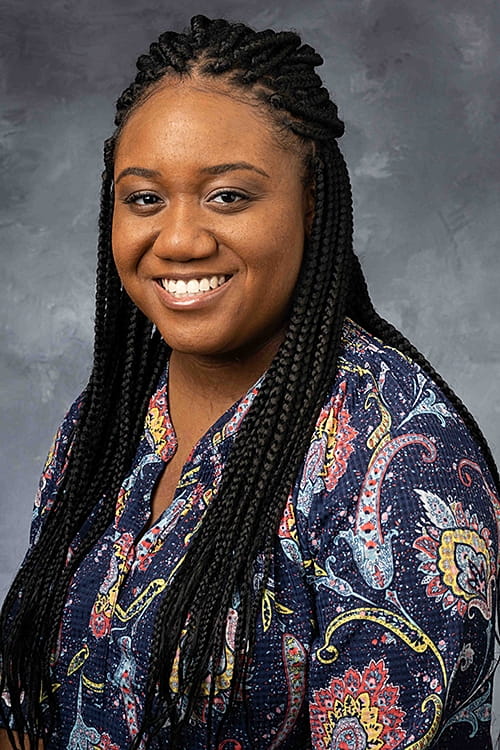
Micah Johnson, PhD student, neuroscience
Maps the roots of migraine
“Micah is an outstanding black graduate student in our Neuroscience Graduate Program. She…is a great advocate for diversity and excellence as a graduate student. In fact, she recently received the Vanderbilt School of Medicine Juneteenth Award for Best Graduate Student.” -Krystal Parker, assistant professor, psychiatry
Hometown: Katy, Texas
Faculty mentor/advisor: Rainbo Hultman, PhD, assistant professor of molecular physiology and biophysics, assistant professor of psychiatry, Carver College of Medicine
What is your degree program and expected graduate date? PhD, neuroscience; 2024
Please describe your research: My research seeks to understand how brain networks contribute to complex brain disorders. I am broadly interested in how different brain regions contribute to migraine-related pain. Further, I’m investigating how early life stress contributes to migraine susceptibility. Together, I’d like to bridge the gap between brain networks, early life stress, and migraine-related pain to discover how we can manipulate brain circuits to provide better outcomes for people with migraine.
In simple terms, why does this research matter? Our lab uses cutting-edge techniques to solve complex problems and discover brain mechanisms underlying complex disorders. By combining molecular, neurophysiological, and imaging approaches we hope to pave the way for more individualized therapeutic approaches to treating brain disorders. Overall, we want to use what we know about basic science research to improve the lives of people with complex brain disorders.
How soon after starting at the University of Iowa were you able to participate in research? Immediately. I completed rotations in three different laboratories before finding my thesis lab.
How has being involved in research made you more successful at the University of Iowa? Being involved in research has given me the confidence to step outside of my comfort zone and take on leadership roles in ways that I’d never expected. Research has also challenged me in the best ways, encouraging me to use my creativity to answer complex questions. Ultimately, research has allowed me to intertwine my passion for advancing knowledge and contributing to a more diverse and inclusive society.
What are your career goals and/or plans after graduation? After graduating, I’d like to pursue a career that allows me to make positive change while encouraging the next generation of scholars to push their limits to contribute to the gaining of new knowledge. Ideally, I’d like to have a career that allows me to be on the forefront of medicine while communicating the latest scientific knowledge and innovation.
Banner location: not on display—
